Resin flooring solutions for factory facilities offer versatile solutions for industrial settings like factories, providing durability, chemical resistance, and ease of maintenance. Choosing the right type of resin flooring is crucial to meet the specific requirements of your factory environment. In this blog post, we will explore the different types of resin flooring systems available and help you make an informed decision based on your factory’s needs.
Epoxy Resin Flooring
Overview: Epoxy resin flooring is a popular choice for factories due to its robustness and versatility. It consists of epoxy resins and hardeners that chemically react to form a strong, seamless surface.
Benefits:
Durability: Epoxy floors are highly durable and can withstand heavy traffic, impact, and abrasion.
Chemical Resistance: They are resistant to chemicals such as acids, alkalis, oils, and solvents, making them suitable for industrial environments.
Easy to Clean: The smooth, non-porous surface of epoxy floors is easy to clean and maintain.
Decorative Options: Epoxy can be customised with different colours, patterns, and textures to suit aesthetic preferences.
Applications: Ideal for manufacturing plants, warehouses, and production areas where heavy machinery and frequent cleaning are common.
Polyurethane Resin Flooring
Overview: Polyurethane (PU) resin flooring offers excellent durability and flexibility, making it suitable for environments with varying temperatures and moisture levels.
Benefits:
Flexibility: PU floors are more flexible than epoxy, offering resistance to thermal cycling and impact.
Chemical Resistance: They provide good resistance to chemicals, oils, and greases.
Hygienic: PU floors are seamless and resistant to bacteria growth, making them suitable for food processing areas.
UV Stability: Some PU formulations offer UV stability, making them suitable for outdoor areas.
Applications: Food and beverage processing plants, pharmaceutical facilities, laboratories, and areas requiring a hygienic environment.
Methyl Methacrylate (MMA) Resin Flooring
Overview: MMA resin flooring is known for its rapid curing time, allowing for quick installation and minimal downtime in operational areas.
Benefits:
Fast Cure: MMA floors cure rapidly, often within hours, allowing for fast-track installations and minimal disruption to operations.
Chemical Resistance: They offer excellent resistance to chemicals, oils, and solvents.
Durability: MMA floors are durable and withstand heavy traffic and mechanical wear.
Temperature Tolerance: They perform well in temperature extremes and are suitable for outdoor applications.
Applications: Automotive facilities, airports, hospitals, and areas requiring fast installation and quick return to service.
Choosing the Right Resin Flooring for Your Factory
Considerations:
Traffic and Usage: Evaluate the level of foot and vehicle traffic, as well as the types of machinery used in your factory.
Chemical Exposure: Assess the types of chemicals and substances the flooring will encounter.
Hygiene Requirements: Consider cleanliness standards and the need for antibacterial or seamless flooring options.
Aesthetics and Customization: Determine if you require decorative finishes or colour options.
Consultation and Installation:
Work with a reputable resin flooring contractor to assess your factory’s specific needs and recommend the most suitable resin flooring system.
Ensure proper surface preparation and installation to maximise the performance and longevity of your chosen resin flooring.
Conclusion
Choosing the right resin flooring system for your factory involves understanding the unique requirements of your industry, traffic patterns, chemical exposures, and hygiene standards. By selecting epoxy, polyurethane, or MMA resin flooring based on these considerations, you can enhance safety, durability, and operational efficiency in your factory environment. Consult with resin flooring experts to ensure you make an informed decision that meets your factory’s specific needs and enhances overall workplace productivity.


